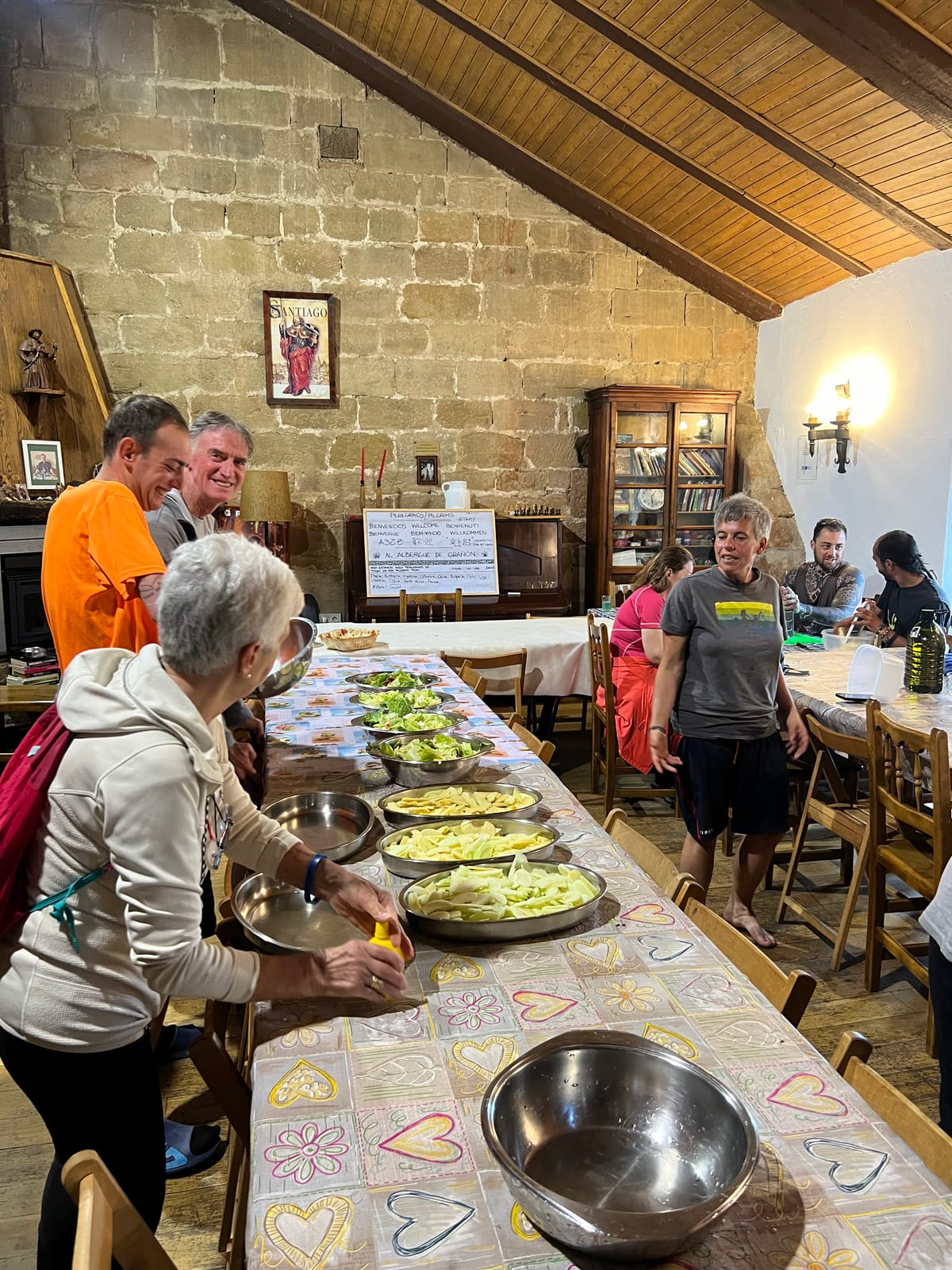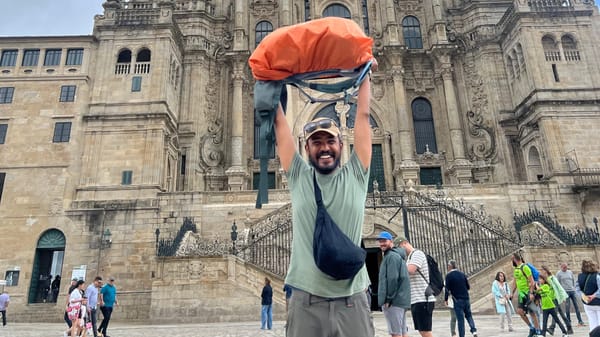Kind and compassionate
My most unique experience at an albergue so far.

I meant to write about my experience at the Albergue de Peregrinos Parroqial in Grañón yesterday, but after a 29 km walk to Villafranca Montes de Oca, I let myself indulge in some fantasy fiction. Today, sitting in front of the cosy fireplace of a nineteenth-century home and with a lot of time, I have no excuses.

Despite living out of Peregrino (pilgrim) albergues over the last two weeks, the experience in Grañón was unique. Unlike the other places I had stayed in, this was a donitivo albergue. This means that there’s no charge to stay there, and you can donate whatever amount you deem fit to them for the stay.

My initial impressions of the place were somewhat mixed. The first thing the ‘hospitalero’ said to us (the three latest arrivals) was that this is your home for the night. Then he sat us down and started talking about the Camino and how we should talk less and listen more (to ourselves) while on the way. Usually, I don’t particularly appreciate being told what to do, but I nodded, waiting to get a bed quickly. Since this was our home and not an albergue, we were expected to do things ourselves - including checking ourselves in. After writing my name in the register, I asked for the stamp for my pilgrim credential. They said they didn’t have one. Weird. All the other albergues had one. Even restaurants and bars along the way had stamps for the pilgrims.

With the formalities done, I was handed a sheet of paper with the schedule for the night. We were to meet in the common area at 5:30 pm to cook dinner together, go for mass at 7, eat dinner at 8, and have some choir at 9:30. I was then led to a room where I could choose any ‘bed’. In this albergue, there were mats on the floor instead of the bunk beds I was used to.
At the designated hour, I got to the common area and was handed a big knife to cut apples. My spoiled self had never really cut many apples - someone would either give me cut fruit or I’d bite into the fruit. Looking at the size of the knife, I was worried that I’d chop one of my fingers off. Slowly, I got into the groove and cut apples into fine slices, wondering what we’d be doing with so many cut apples. Others washed lettuce and cut tomatoes, peppers and meat. At that point, I got worried. What if they did not make anything vegetarian? Using broken Spanish words, I went to a lady in the kitchen who looked like she was in charge and said, “I am a vegetarian. Are you making anything sin carne, sin pescado (without meat, without fish). She pointed towards another man and said that he was the chef, I should speak with him, and we were making Spaghetti Carbonara. My heart sank. I would have to figure something out for dinner. Anyway, I went to the person, who I later got to know was named Eugene, and asked him the same question. He thought for a moment and asked if I’d be okay eating pasta with tomato sauce. I gratefully said yes and thanked him for accommodating me. A little while later, Eugene came to me with a jar of chillies and asked if I’d like the sauce spicy. I was touched! Instead of being frustrated about cooking another dish for me, he went out of his way to make something according to my taste!

The environment around was electric. People were busy preparing the dinner. Someone who knew how to play the piano started playing, and we sang Imagine by John Lennon, Let it Go from Frozen and, unsurprisingly, Bella Ciao. Eugene came with a spoon and made me taste the sauce he had prepared. It was delicious!
When the clock struck 7, some people went out for mass. The lady I had approached earlier asked me if I could help take the dish with the cut apples, which now had a layer of dough, to the bakery. I realised then that I had contributed to making apple pies! This humble dinner was almond turning into a feast.
At dinner, everyone sat together. After talking a little about the history of the albergue, the hospitaleros rapped a prayer in appreciation of the food we had in front of us. We had bread, salad with vinaigrette, spaghetti carbonara (penne arrabbiata for me), apple pie and vino tinto. It was the best meal I had had since I left India. And that includes the Vegetable Curry and Naan I had at an Indian restaurant in Logroño.

I felt grateful for the roof over my head and the delicious meal I had just had when the hospitaleros asked those interested to join the church. So apparently, the albergue was technically a part of the church, and a door led us directly inside the church on a balcony overlooking the altar. I walked in, and at first, I felt like I had entered an Eyes Wide Shut situation. The balcony was lit only by candles and had these long, straight wooden chairs with huge armrests on which lay the candles. We sat in these chairs, only seeing each other’s faces in the candlelight and the lit altar of the church in the distance. I was intrigued and wondered what would happen next. Was I getting inducted into some secret society (I recently read Pauli Coelho's ‘The Pilgrimage’)?

One of the hospitaleros got up and asked us to reflect on what brought us to the Camino, what we seek from it and who we’ve left behind. The room got silent, as people thought. After a bit, he held a candle and said that each of us would get an opportunity to share, in our language, anything on our mind or about the Camino. He went first and spoke in Spanish and then passed the candle to the next person in the circle. It felt like one of the activities I had done early on at Teach for India, where we shared our life journey until that point, but with added mysticism. As the candle was passed on, some people broke down, others seemed increasingly reflective, but everyone listened to each other despite the language barrier. When the candle came to me, I spoke about my life before the Camino and what has changed since I came here. In the end, we all got up and held each other’s hands in a circle.
The following day, I had a quick breakfast, left my donación in the box, and left the albergue thinking about my experience in Grañón and deciding to write about it.
Interestingly, today, on the walk, I met Eugene, the chef. I had imagined that he was one of the hospitaleros or a volunteer at the albergue, not a pilgrim! We walked together, and he told me that he had done many other Caminos, had been walking for a year, and had covered 7000 kilometres already. And I thought 780 kilometres was a lot!



